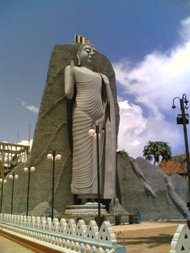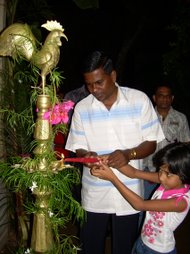Through trial and terror Musharraf triumphs Pakistan's President and military chief Pervez Musharraf is almost certain to win tomorrow's presidential election. Democracy sometimes does funny things. Musharraf, who is clearly not so popular with the masses, is more than confident that he will be elected by an electoral college which comprises members of both houses of Pakistan's parliament and regional assemblies in Punjab, Sindh, Balochistan and the North West Frontier Province. On Wednesday hundreds of opposition provincial and state lawmakers resigned their seats in protest against what they saw as a big sham. Till last week's Supreme Court decision that cleared the way for the military ruler to stand for elections, many analysts believed that Musharraf's fate had been sealed. But for Musharraf, a master military strategist, politics is kids' play. Under his administration, the country’s economy has been growing at a healthy 8 percent, making the city folks happy. He banks on the economic success and has outsmarted all his opponents, trapping some in an apparent political snare he has set up and punching and kicking others. Among those who appear to be caught in the snare are Pakistan's two-time prime minister Benazir Bhutto and her Pakistan People's Party. Nawaz Sharif, another two-time prime minister, of course, received the blow which landed him in Saudi Arabia. If only tomorrow's presidential election were put to popular vote, Musharraf's victory will be as uncertain as the outcome of an India-Pakistan cricket match. It was only months ago that Musharraf was embroiled in a street battle with Pakistan's judiciary. Musharraf's decision to dismiss the country's chief justice, Iftikar Mohammad Chaudhry, on March 9 sparked countrywide demonstrations — with lawyers demanding an end to dictatorship. The demonstrations ended only when the remaining judges of the Supreme Court reinstated Chaudhry. Musharraf defended his decision, alleging that the Chief Justice had abused his powers but analysts said the move was linked to the president's fear that the judiciary would be an obstacle to his reelection bid. A reinstated Chaudhry gave a series of anti-government rulings. The ruling that allowed Sharif to return to Pakistan from exile in Saudi Arabia is a case in point. Many believed that the cases filed by the Jamath-e-Islam, Imran Khan's Tehrik-e-Insaf and others challenging Musharraf'’s eligibility to contest the presidency while in uniform would go against him. But the Supreme Court cleared the way for Musharraf to contest the election by simply obtaining a promise from his lawyers that he would shed the uniform after the election and dismissing the case on the basis the petitions could not be maintained on technical grounds. The nine-bench court did not include Chaudhry in keeping with hallowed judicial principles. But the 6-3 majority decision in favour of Musharraf drew criticism from legal analysts with some saying that the court failed to go through the substance of the petitions. One of the petitioners, Qazi Hussain Ahmed, told the media he had reservations regarding the attitude of the judges who, he felt, had compromised under government pressure. Whether the allegations are sour grapes or not, the developments tend to expose Musharraf's dictatorial leanings and embarrass even the United States, which considers him as a strong ally in the war against terrorism. There was strong opposition to Musharraf in pro-democracy circles in the United States, particularly after he sacked the Chief Justice in March. But luck was on Musharraf's way. At a time when he was feeling that he was becoming an embarrassment to Bush and other western leaders who are backing him, the Red Mosque rebellion offered him an opportunity to prove his importance. He handled the mosque standoff in a manner that pleased the West — but certainly not a majority of the people in Pakistan. More than one hundred Islamic activists and madrasa students were killed when soldiers stormed the mosque. A day before the raid, a female student told the media she believed the standoff would be solved peacefully because "Pakistani soldiers are true Islamic soldiers". She became one of the first casualties when soldiers opened fire — a collateral damage in the war against Islamic extremists. The little or no condemnation from the West of the military action was more an endorsement of Musharraf's iron-fist approach. But the Pakistanis, especially those in the North West Frontier Province, were not happy. Many believed the Red Mosque crisis could have been solved through peaceful means or in a non-lethal way. Musharraf scored brownie points with the United States. The military action against Red Mosque mullahs and students restored Washington's confidence in Musharraf. The Bush administration is not particularly keen on the return of full-fledged democracy in Pakistan. It is mainly concerned about the stability of Pakistan, even if it means a political mixture of pseudo democracy and dictatorship. Pakistan's stability is vital for the United States to continue the war in Afghanistan. The return to full democracy will not produce a strong leader like Musharraf who will not hesitate to use fire power to crush anti-Americanism. A Bhutto or Sharif would have been a misfit to govern Pakistan at a time when the Bush administration decided to bomb Afghanistan and threatened to pound Pakistan to the Stone Age. To his credit, Musharraf handled the situation in Pakistan's best interest, but his subsequent over-obeisance to the Bush administration, even after the United States invaded Iraq, earned him the wrath of Pakistan's Islamic-minded people. Please note that Pakistanis are not Islamic extremists but most of them are Islamic-minded and are hurt by the US invasion of Iraq. The scenario has not changed much. The services of Musharraf are required more than ever in the face of a Taliban resurgence in Afghanistan and also in Pakistan. So far this year, some 1,900 people, including 650 civilians and 350 soldiers, have died in Pakistan in violence linked to Islamic extremism. The figure for 2006 was 1,470 while 2005 gave a casualty toll of 648. Between the first suicide attack in Pakistan on March 22, 2002 and 2006, there were 22 suicide attacks but so far this year, there have already been 41 such attacks. The United States needs Pakistan, especially Musharraf or a like-minded leader, to prevent any Taliban victory. The recent South Korean hostage crisis showed how powerful the Taliban had become and how helpless the Hamid Karzai government was. In desperation, Karzai last week urged Taliban leaders Mullah Omar and Gulbuddin Hekmatyar to join the government. Any Taliban victory will be a major blow to the Bush administration, which has already become an object of derision for its failure to defeat a few thousands of Kalashnikov-branding fighters. A majority of the Taliban fighters are from Pashtun tribes living in either side of Pakistan-Afghanistan border. The Pashtuns do not recognize the border. They enjoy free movement and identify themselves with the Taliban's war against the US-led NATO forces and the Karzai government. Political developments in Pakistan in recent months have been full of suspense and drama. The Musharraf victory will not end the show. The suspense and drama will continue. Bhutto is coming to Pakistan on the 18th. The Musharraf government has agreed to drop all charges against her — a concession it did not offer to Sharif. Lawyers of Sharif have filed a contempt case in the Supreme Court charging that the government had deported their client despite a court ruling that he could return to Pakistan. This case is also attracting much attention. The Parliamentary elections will be held in January. The questions as to the composition of the new assembly and whether Bhutto could be the prime minister add to the suspense. The biggest drama could unfold if Musharraf fails to honour his promise of doffing the uniform, although he on Tuesday named his successor to the post of Chief of Armed Services. Many people might say such a scenario is unlikely, but politics is all about a struggle for power and in this struggle anything is possible. In a typical set up, Pakistan's president is more a figurehead though he retains the power to dissolve parliament. But it is unlikely that a civilian president in Musharraf will play second fiddle to a prime minister. Musharraf will continue to enjoy the support of the military even after he sheds his uniform. His election as a civilian president, therefore, is seen by most analysts as a cosmetic exercise. He will rule Pakistan like a military leader with the backing of the army. The Prime Minister, whoever he or she is, will have only limited power.
|
"Star Lanka Online" Our NEW Web site And Web TV Channel Launched
TFGE , The Future Global Educational Center Has Launched
the official web site, called
*** Star Lanka Online Dot Com ........................
www.starlankaonline.com will be completed in very near future....
*** Star Lanka Online TV Channel,..................
Just One Click ahead ...
Now you can watch "Star Lanka Online TV" channel broadcasts from Matara, Sri Lanka in most part of the day. Still we are keeping a test transmission also. There is a link right side of your hand to watch our TV channel. You can watch (Click On the Box) live channel on this site without going to another site to watch the TV. and also recorded parts, following the below link.
the official web site, called
*** Star Lanka Online Dot Com ........................
www.starlankaonline.com will be completed in very near future....
*** Star Lanka Online TV Channel,..................
Just One Click ahead ...
Now you can watch "Star Lanka Online TV" channel broadcasts from Matara, Sri Lanka in most part of the day. Still we are keeping a test transmission also. There is a link right side of your hand to watch our TV channel. You can watch (Click On the Box) live channel on this site without going to another site to watch the TV. and also recorded parts, following the below link.
Place your Own Ad Here
Friday, October 5, 2007
Through trial and terror Musharraf triumphs
Posted by
Priyantha De Silva
at
1:58 AM
![]()
Labels: World News
Subscribe to:
Post Comments (Atom)






















































No comments:
Post a Comment